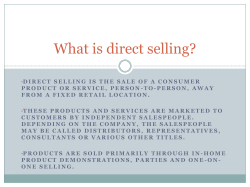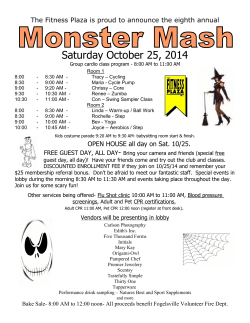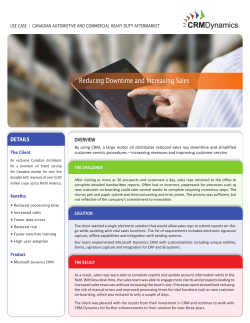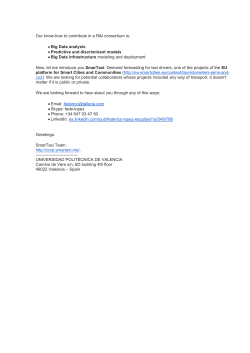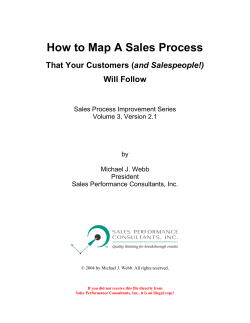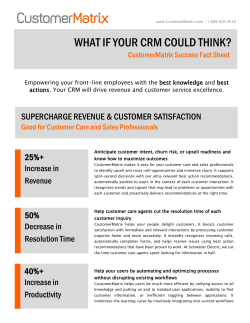
Please click here
The CPR of Sales Getting Back to the Fundamentals ABOUT THE AUTHOR Woody Davis, an experienced sales leader dedicated to helping other sales professionals reach their goals and potential is the current Vice President of Sales at CRMPoint, a unique Customer Relationship Management (CRM) Development firm specializing in Microsoft Dynamics CRM. Woody is a retired US Navy Veteran, Husband and father of three and grandfather of nine. Along with his leadership at CRMPoint, Woody’s experience includes leading a statewide sales force at a major copier manufacturer for 10 years. www.linkedin.com/pub/woody-davis/13/898/b51 CRMPoint Headquarters 12616 W. 62nd Terrace Suite 113 Shawnee, KS 66216 Texas Office 16225 Park Ten Place Suite 500 Houston, TX 77084 Florida Office 1802 Alafaya Trail Orlando, FL 32826 Arizona Office 60 E Rio Salado Parkway Suite 900 Tempe, AZ 85281 Minnesota Office 15025 Glazier Ave Suite 104 Apple Valley, MN 55124 We are ready to share our passion with you! We always offer complimentary consultations. Call us today at 1-877-CRM-1411. INTRODUCTION When my son was 12, I taught him how to pitch. He had a strong arm and put the fast in fastball. We started with the fundamentals: rock back, line up and throw. Whether we were practicing in the backyard or he was playing on the baseball diamond, the key to success was doing the exact same thing, every time. As he got older, he became a very good pitcher and learned how to throw splitters, curveballs and more. But he always went back to the fundamentals. Any person playing a sport or perfecting any skill will continue to go back to the fundamentals. For musicians, it also comes down to the basics. Even if you’ve played piano at Carnegie Hall, you still have to practice the scales. In sales, we’ll experience success when we go back to the fundamentals too. We know what actions result in sales, and we go back to those basics with consistency, persistence and resilience. I call this Sales “CPR.” CPR, in a medical context, is Cardio Pulmonary Resuscitation. If you look across a crowded room, you’ll notice a variety of people of different shapes and sizes. On one side of the fitness bell curve is a man who exercises regularly, eats right and knows his heart is in great condition. On the other side of the curve is a heavy smoker who is a little overweight and eats cheeseburgers three times a week. Which one do you think is closest to needing CPR? Now, we learn CPR with the hope that we may never have the need to use our training. But aren’t we glad there are those out there who know the process and have that life-saving knowledge? CPR is only the basics, of course, and even one day in medical school would teach you much more. But these are the fundamentals, the basics, the core. And so, back to Sales CPR, also an acronym (Consistency, Persistency & Resiliency) — the fundamentals, the basics, the core of sales success. I will endeavor to define these principals throughout the course of this book to share how these three fundamental traits have helped drive the best sales professionals to success. I had a sales mentor at the start of my career who gave me great advice. It was the start of my first year and, I’ll admit it, I was terrified. He noticed my response to the seemingly unreachable goal that had been passed down from the main offices. It just felt too big, my eyes glazed over and I felt numb. He looked at me and said, “How do you eat an elephant? Isn’t it one bite at a time?” He had a few more memorable and colorful quotes that would remind you of Alec Baldwin, which we won’t go into now. Let’s just say that I didn’t think I could drink coffee in my first few weeks. But this phrase resonated with me so much that I posted it above my desk. So, whether you’re at the start of a new year, a new month, or just a new day, the secret to meeting your goals with confidence is returning to the fundamentals of the profession. “...how do you eat an elephant? Isn’t it one bite at a time?” CRMpoint.net • 1-877-CRM-1411 • info@crmpoint.net con·sis·tent — adjective : always acting or behaving in the same way : of the same quality; especially : good each time : maintaining a particular standard or repeating a task with minimal variation Talk to successful athletes about what keeps them focused and you’ll get the same answer: knowing (and remembering) the fundamentals. Over and over again, the most successful athletes get back to the basics. The same good things get the same good results. Successful business people and other professionals will say similar things.“Remember the fundamentals of success and visit them often.” What makes a sales team successful isn’t only what happens as the sale is closed. What makes a sales team successful is the process, the habits and the strategy. The first part of Sales CPR is C. And C stands for CONSISTENCY. Consistent salespeople set high standards and then keep at them. They know the habits that help them succeed and keep these up. They build relationships with prospects and customers alike, in a way that’s more a marathon than a sprint. They put effort forward on a daily basis, with little variance. A sales professional will know five traits and actions that must be accomplished on a regular basis. 1 Activity is king. Most of us know what the right things are to do as salespeople. Networking, calling, researching, asking good questions, following up, keeping good records . . . the list goes on. All these tasks are important, and all will contribute to strong sales — but only if they’re done consistently. Consistent activity will bring sales, but activity for activity’s sake isn’t what we’re talking about. A haphazard approach, even if it includes the right tactics, won’t bear good results. 2 want to do those tasks that are more difficult, like picking up the phone and calling a prospect. So we tend instead to do those tasks that are easier and more fun instead, like networking. Consistency matters in both what’s hard and what’s easy. And just as important is tracking what you do. Good sales teams tackle the hard and the easy, on a regular schedule and a regular basis. So how do we shift away from an erratic approach and into a consistent approach? Cultivation is the key. Part of this is scheduling and knowing what works best for you. A good salesperson needs to know how to structure a workday towards consistency — and to keep track of each activity. For example, some salespeople might check email first thing in the morning, every morning; others wait until later in the day. Some salespeople might make 30 calls at the start of every day, and others may tackle these in the afternoon. No matter what schedule you choose, you have to choose to be disciplined. Create a to-do list and stick to it throughout the day. Consistently being a person of good habits and characteristics and quality is the way towards sales success. Then make sure each item is tracked. Interacting with your prospects consistently is what moves them through the pipeline. Needing that pipeline of prospects hasn’t changed, but how we get those prospects has changed. LinkedIn was still in beta form 10 years ago; today, it’s what I rely on. I spend an hour each morning on the professional network, looking at the best trends, updating my profile, commenting and building relationships. Those lead to prospects. Salespeople who ignore LinkedIn are missing out. Tracking activity properly matters. Having the tools to keep up with the 50, 500 or 5,000 contacts that you are managing will give you confidence. We tend to not CRMpoint.net • 1-877-CRM-1411 • info@crmpoint.net people, and more importantly, people buy from people they know and trust. So keeping your promises leads to success . . . if you can gain the trust of your prospects, then they’ll stay with you when they become your customers. Keeping track of promises helps you fulfill them. 4 Know that failure is inevitable. I believe that we need to track all activity and be honest with our failures too. We’re not going to win everything. It isn’t going to happen. Failure is a reality. But when we track our wins and track our losses, we can put into perspective what reality is. J.D. Gershbein is a top thought leader on LinkedIn for business and personal branding, and a featured blogger for The Huffington Post. He writes: “Although much has changed regarding the site, successful use of LinkedIn still hinges on representing well, connecting with the right people, and effectively pulling online conversations offline. Those who have embraced social networking in their businesses are aware of the good that LinkedIn can do when worked consistently. More and more users are activating every day.” www.linkedin.com/in/jdgershbein After spending time on LinkedIn, I check my CRM — this helps me determine what is coming up, what needs to be followed up on and who I need to connect with that day. Using this system, I’m able to consistently shift prospects through the sales pipeline. Consistency also matters in sales appointments. Three appointments every day — one in the morning, one at lunch and one in the afternoon — builds that pipeline. And don’t eat lunch unless you’re buying someone’s lunch. This regular schedule ensures I’m making regular connections. We typically work from a Lead, Opportunity and Close model when working with our contacts. And so it’s important to know where each prospect is in the cycle — and knowing what the next steps are will lend to success. 3 Keep the promises you make. The sales profession gets a bad rap sometimes. Salespeople can easily want to do so much that we fail to properly follow up with the things we promised. It’s not that they are over-promising and under-delivering; it’s that they’re promising and then not delivering at all. It’s true that people buy from 5 Care — really care. Be truly interested in your prospect’s business goals and help your prospect achieve them. This starts with doing your research and continues with asking the right questions to find out what the prospect wants to accomplish. As the sales great Zig Ziglar said, “You will get all you want in life if you help enough other people get what they want.” From a management perspective, you can encourage consistency by wanting to help your people instead of wanting to control them. This is what it means to be a caring coach. Know the strengths of every person on your sales team, and consistently manage towards those strengths. For sales managers, a good follow-up system can help you make sure your team is doing the right things, and doing them consistently. Like a coach on the sidelines, a CRM system can allow you to watch what your team is doing from a distance, and then connect when needed. You can step in to compliment, challenge, encourage or correct, just at the moment it’s most needed. per·sis·tent — adjective : the quality of continuing steadily despite problems or difficulties : continuing to endure over a prolonged time period When my son was perfecting his pitching arm, I remember thinking about my days as a 12-yearold. I never wanted to play ball. It just wasn’t in my plan when I was a kid. But as a dad, when my son showed interest, I wanted him to realize his dream. So, I learned the basic fundamentals of pitching and worked with him to learn to be consistent. Initially, I would place his arm at the right position or make sure he was throwing from the stride in order to deliver the ball properly. As he became more proficient, my interaction was less while my encouragement became more important. Sales Managers who understand their proper role in their sales people’s day can best encourage from the sidelines and interact only when it’s needed. My advice is to invest in the right tools like a good CRM or good sales training to help your people realize their goals, and interact when needed. Here’s a crazy statistic: 47% of salespeople give up after just one follow-up call. That’s right, about half give up after just one attempt. Persistence puts you in the other half, and it’s that stick-to-it quality that brings success. No matter what we’re trying to master, it’s certain that we will encounter setbacks. If sales consistency is going back to the fundamentals of seeing people every day, then sales persistence means that you’ll keep doing this every day, no matter what obstacles occur. The second part of Sales CPR is P. And P stands for PERSISTENCE. We all have things that try to attack our day, things that get in the way of the sales fundamentals. It’s easy to get sucked in by these things. Constantly dipping into that barrage of email, for example, can carry us quickly from 8 am to 5 pm, and we’ve met no one and made no sales. Social media, especially LinkedIn, can be an incredible tool for sales, but it’s easy to waste several hours and have no results to show for it. Internal obstacles get in our way too. Admin, travel, planning, service and order processing are all part of the sales job description, but without persistence, they can easily encompass our day, and we’ve made no sales calls at all. How people are buying is changing. In 2007, it took an average of 3.68 cold call attempts to reach a prospect. Today, less than 10 years later, it takes eight. To further complicate the sales process, most customers begin their purchase process well before they engage with a salesperson. Much of the purchase process takes place online . . . in fact, buyers are 57% of the way through the buying cycle before they reach out to sales. And for more complex purchases, this number increases to 70%. This is why persistence has never been more important for sales success. It’s still true that people buy from people, businesses buy from people and they both buy from people they trust. Therefore, the key to successful selling is keeping track of your leads and opportunities you’re working on. Without a system in place, it’s nearly impossible to keep track of the promises you make. Sales professionals need to build the trust with the people they are contacting. They need to have key performance indicators in place, giving them the ability to maintain that trust. As these contacts develop into relationships, you must have a system and process of managing those relationships — your CRM. CRMpoint.net • 1-877-CRM-1411 • info@crmpoint.net Good sales teams give it their all in the face of difficulties and challenges, looking fear right in the face. Fear was my main obstacle my first year in sales — and every year since, actually. As a coach, it’s your job to look after your team. A good CRM system allows you to watch the data that’s pouring in. You can help coach your charge and make them better, giving your sales professionals advice to make them better. Armed with this data, you can help your salespeople overcome that fear. Eleanor Roosevelt said “Do one thing every day that scares you.” As we eat that proverbial elephant — remember, one bite at a time! — we must have the tools available to follow through with persistence, even when we don’t want to. Automating follow through is one way to streamline persistence, making sure we continue to follow up and follow through. That constant loop keeps us persistent and keeps us selling. Persistence means never giving up, and staying on the path. Good sales teams give it their all in the face of difficulties and challenges, looking fear right in the face and building relationships that lead to strong results. I was recently at a networking event designed to allow entrepreneurial conversations and presentations to take place. The main speaker that day was the CEO of a company whose product will one day outshine GE if they are successful. Intrigued, I wanted to learn more about the simplistic approach the owner was taking in growing his small startup. There was a large line to meet this CEO and it was a little intimidating to just walk up and engage him in conversation. But with sincere curiosity to learn more about his company’s building process I did. Of course, he eventually asked, “What is that you do?” “I help companies organize their customer relationships using the power of Microsoft Dynamics CRM, making it affordable for a small to medium sized business to customize a CRM matching their processes rather than their processes changing for the technology, ” I answered. “You must be kidding,” he responded. “We’ve been looking for a CRM Development company for months and need help with exactly what you do.” The rest is history. These types of engagements happen all the time . . . but only because of persistence. After this presentation, I could easily have pulled email up on my phone, made small talk with people I already knew or just headed to my car. But I am amazed at the business that takes place with persistent conversations. re·sil·ient — adjective : the ability to quickly recover after setbacks : able to withstand difficult conditions : able to spring back after bending, stretching or being under stress No athlete makes every shot, hits every ball or blocks every goal. And it’s the same in sales. It’s an obstacle if you fail but you don’t need to stop. And that’s what resilience means: the ability to quickly recover after setbacks. You’ll be betting on a sale coming through, and you don’t get it. What salespeople tend to do is run to the corner and lick their wounds. But what would happen if a championship baseball player struck out in inning one and inning three and in inning six, told his coach he’s failed, so he’s done? He’s given up on opportunities for success in innings seven, eight and nine. He might have hit a grand slam later in the game. For the team’s sake and his own he has to keep going. Sometimes, you’ll have prospects go silent on you. You’ll have sales that don’t close. You’ll stumble on a sales call. But back to the fundamentals you go. Return to the basics and approach it with resilience to get back on top of your game once again. The third part of Sales CPR is R. And R stands for RESILIENCE. When they face setbacks, resilient salespeople bounce back. Challenge? Accepted. Problem? Let’s find a solution. That positive attitude transcends their processes and habits. 80% of sales are closed after the seventh call. Resilient sales teams don’t give up on call one or call six. Remember, failure is inevitable. It’s part of the territory. And when (not if, but when) we fail at our goals, we have to take the right path to correct it. What sets the great salespeople apart from the rest is not how many sales they make or how quickly they make them, but how resilient they are when they don’t make a sale. Go back to the things you did at first and you’ll fall back in love with selling. As always, returning to the fundamentals is critical in sales — and its one way you cultivate a resilient character. In this day and age, if a salesperson stays in his or her role for more than four years, that’s an anomaly. There may be external setbacks, like the company restructuring or relocating. There may be internal setbacks, like chasing big deals all year and not closing. But you can’t give up on yourself. You have to keep going on. I can’t offer a list of bullet points on how to become resilient. It’s cyclical. If you don’t experience setbacks, you’re probably not doing your job. Of course we want to be successful in selling. But those successes sometimes happen in conjunction with setbacks. Just as sales are made by resilient professionals, history is made by resilient people: CRMpoint.net • 1-877-CRM-1411 • info@crmpoint.net • Oprah Winfrey was demoted from her first job because she “wasn’t fit for television” — and her multi-awardwinning talk show was the highest-rated program of its kind in history, and she’s been called the most influential woman in the world. • Michael Jordan was cut from his high school basketball team, and has missed more than 9,000 shots in his career — and then became a six-time NBA champion, five-time NBA MVP and four-time NBA all-star. • Walt Disney was fired from a newspaper for having “no original ideas” — and he then won 22 Academy Awards. • The Beatles were rejected by DECCA studios, told they “have no future in show business” — and are the most commercially successful and critically acclaimed band in history. • Dr. Seuss was rejected by 27 publishers for his first book — and then he became the best-selling children’s book author in history. • Abraham Lincoln was defeated in eight elections and failed in business — and then he became the 16th President of the United States. As the General Manager for a major copier manufacturer, I started the sales process with the a large state agency in 2006. I had been consistent and persistent in every aspect of the relationship, following up with people frequently and keeping my promises year after year. In 2009 — more than three years after our relationship began — I was on cloud nine when we were awarded the contract. This was a major announcement, with $15 million on the line. This was a big victory, both for my company and me. But the next day, I got a phone call. Sorry, they said. They had made a mistake and misread the bid. The State was ready to award the contract to our competitor. At that moment, it would have been easy to plant our feet, consider suing and cut ties. However, we were resilient in our relationship. I returned to the relationship I’d built with the state. We spent weeks in negotiations and, finally, split the contract. We had the contract for years to come. Having a good system for follow-up is key to being resilient. Had I not tracked my relationship progress with the state, I likely wouldn’t have stayed in touch at all, let alone been considered for the major contract. At one of my first roles, we called our CRM “the system.” Our sales manager would ask each of us to tell him about the people on our list, ensuring that we wouldn’t run from a setback in those relationships. Everyone needs some kind of system. This makes sure you remember the promises you’ve made, connect with your contacts and track the needle. What do you think you’ll be doing 365 days from today? My hope is that your consistent work, persistence with prospects and resilience when the going gets tough will have you celebrating your best year yet. CONCLUSION Motivation is something that’s always evolving. At the start of my career, I entered the sales profession to make more money and have more freedom. Fair enough motives for launching a career . . . but that changed quickly. After I gained my first client, I quickly realized that the sales profession is not about looking out for number one. Sales, in practice, is about solving problems and providing results for those who are searching for solutions. It became more fulfilling for me to solve issues for business owners and managers, and to help sales teams grow. That problem-solving motivation is still my heart today, and it’s a significant part of a successful sales team. There’s much to be said about the art of the sale, and about how to navigate and finesse those all-important asks. But what makes a sales team successful is not only what happens as the sale is closed. What does make a sales team successful is the process, the habits and the strategy. I’ve worked for a variety of companies and sold a variety of items, to people and to businesses. The product can change, but the traits of the people who sell them are the same no matter what. Great salespeople are consistent, persistent and resilient — no matter who they’re selling to and no matter what they’re selling. Pair these abilities with a good system for managing relationships and watch sales soar. Ultimately, your sales team’s CRM system is a tool. It’s a powerful tool and can carry your sales team to new heights when it’s used well. But these good habits and commitments to process are what differentiate those successful sales teams. CRMpoint.net • 1-877-CRM-1411 • info@crmpoint.net CRMPoint Headquarters 12616 W. 62nd Terrace Suite 113 Shawnee, KS 66216 Texas Office 16225 Park Ten Place Suite 500 Houston, TX 77084 Florida Office 1802 Alafaya Trail Orlando, FL 32826 Arizona Office 60 E Rio Salado Parkway Suite 900 Tempe, AZ 85281 Minnesota Office 15025 Glazier Ave Suite 104 Apple Valley, MN 55124 We are ready to share our passion with you! We always offer complimentary consultations. Call us today at 1-877-CRM-1411.
© Copyright 2025

